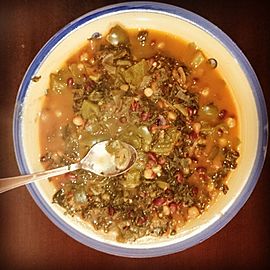Githeri facts for kids
 |
|
| Alternative names | Succotash, muthere or mutheri |
|---|---|
| Course | Main course |
| Place of origin | Kenya |
| Region or state | Any region |
| Serving temperature | Hot |
| Main ingredients | Sweet corn, Red Beans, black beans, maize lima beans, butter, salt |
Githeri (Gĩtheri), also called muthere or mutheri, is a Kenyan traditional meal of maize and legumes, mostly beans of any type mixed and boiled together. The maize and beans are mixed together in a sufuria or pot, water is then added and the mixture is boiled until the food is cooked and ready to eat. Githeri is the staple food of the Gikuyu, Meru, Mbeere people and Embu people in the Central Province and Eastern Province of Kenya, but it is also popular in other parts of the country and other communities, such as the Kamba people of Eastern province of Kenya. The beans and maize can either be fresh or dry, but most people prefer fresh because it is much softer, and better tasting. It is easily accessible because maize and beans are readily available in these areas since they are mostly sourced directly from local farms and homesteads.
Githeri can also be made into a stew with the addition of vegetables and potatoes, and sometimes meat. Githeri is also used to make mukimo after the addition of potatoes, bananas, and greens, and mashing up the mixture. Lately, there has been a rise in the popularity of Githeri due to the health benefits associated with the plant-based dish.
The same dish based comprising two key ingredients of maize and beans other available legumes and even ground nuts is known by other names and as a traditional dish from at least as far north of Africa as Ethiopia right down to South Africa. Kande, Pure and Ngate are some of the names it goes by in different parts of Tanzania. The dish has quite a much bigger footprint than just Kenya and the Gikuyu tribe.
Part of the popularity of this dish arises because it has been the main meal served to students since the 1920s. Eating githeri is now a trend for young people. Many hotels in Kenya serve githeri.
Contents
Terms associated with githeri
Kikuyu language
- murugarugio – githeri put in a plate direct from the pot, with only salt added to it. murugarugio comes from the Kikuyu meaning moving up and down. Once the salt is put the plate is shaken up and down.
- gikangu (pronounced gy-kah-ngoh) – cold githeri with more maize than beans. Traditionally was cooked in poor households and served to school-aged children.
- kagoto – ballast in English; this is a slang name for githeri used by secondary school students in Central Province.
- mbeu – seeds; the githeri is described as seeds because it contains whole maize and beans.
- mukimo – githeri mixed with potatoes, greens and bananas, then mashed together.
- mutheri – another name for githeri.
- muthungu – githeri made out of maize exclusively without beans. Muthungu means "the white man" which is a fitting name for a dish full of white seeds.
- kibecu – slang for githeri amongst young Kikuyus.
Mbeere language
- mbeu – seeds; the githeri is described as seeds because it contains whole maize and beans.
- mukimo – githeri mixed with potatoes, greens and bananas, then mashed together.
- muthokoi – githeri with corn whose testa (seedcoat) has been partially removed.
Kamba language
- isyo – general name for githeri.
- mukeu – githeri made of undried (fresh) corn and legumes(beans).
- muthakyo – githeri which has only been boiled and is served without any soup in it.
- muthokoi – githeri with corn whose testa (seedcoat) has been partially removed.
Luo Language
- nyoyo – general name for githeri in Luo.
- mahanya – shelled maize boiled and eaten without beans
Kalenjin languages
- kwankwaniek – general name for githeri; loosely "cooked,cooked food", from kwany (cook)
Slang
- murrum murro – Swahili slang (Sheng) for githeri due to its similar appearance to murram roads; popularly among high school students.

